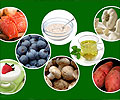
It has since vented its anger by ordering stricter veterinary controls on Norwegian salmon -- analysis so time-consuming that the fresh fish has ended up rotting in Chinese warehouses, according to industry officials.
"We expected our exports to China to increase by 30 to 40 percent this year. That didn't happen," Christian Chramer, spokesman for Seafood Norway, told AFP.
That is an understatement: sales of fresh Norwegian salmon were halved in the first eight months of the year.
The drop was particularly noticeable immediately after the Nobel prize ceremony in December 2010: Norway's exports totalled 1,000 tonnes in December, falling to just 315 tonnes in January, then 75 tonnes in February.
In order to circumvent the obstacles put up by Beijing, fish farmers have shipped their products destined for mainland China first to Hong Kong. But this loophole has now also largely been closed.
Advertisement
By targetting salmon, Beijing has selected a product highly associated with the Scandinavian country in a move that does no harm to Chinese consumers who can easily get their hands on Scottish salmon instead.
Advertisement
But it does "not totally" compensate, said Marine Harvest, a world leader with fish farms in six countries.
"China's salmon consumption is growing and the other (non-Norwegian) producers are now increasing their sales," says Joergen Christiansen, a spokesman for the group that farms one-fourth of the Atlantic salmon produced worldwide.
While the Chinese market remains small compared to countries like France and Russia, it is growing rapidly and is expected to become a key outlet in the future.
Excluding the salmon issue, bilateral trade between China and Norway has seen "no Nobel effect yet," according to a study conducted by Statistics Norway and published in early September.
In the first half of the year, Chinese imports from Norway rose by 16 percent, primarily because of the rise in prices of raw materials of which the Scandinavian country is rich.
Chinese exports to Norway meanwhile swelled by 43 percent.
Beijing's anger is however being felt at the political level: it has suspended until further notice negotiations on a free trade agreement with Oslo and has frozen top-level diplomatic relations.
In the first visit to China since the Nobel ceremony, a Norwegian minister was allowed to take part in an international energy conference in Beijing on September 22 alongside senior Chinese officials, a step the Norwegians would like to see as the beginning of a thaw in ties.
That hope is premature, observers say.
"Normally, after such a conflict, a certain period of time is needed before the two governments resume contacts," said Xu Tiebing, a professor of international relations at the Communication University of China.
"It's difficult to say how much time. The situation has not really progressed for the time being," he said.
Source-AFP












